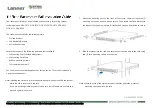
Intel® Xeon® Processor 5600 Series
18
Specification Update, March 2010
Errata
BD1.
The Processor may Report a #TS Instead of a #GP Fault
Problem:
A jump to a busy TSS (Task-State Segment) may cause a #TS (invalid TSS exception)
instead of a #GP fault (general protection exception).
Implication:
Operation systems that access a busy TSS may get invalid TSS fault instead of a #GP
fault. Intel has not observed this erratum with any commercially available software.
Workaround:
None identified.
Status:
For the steppings affected, see the
BD2.
REP MOVS/STOS Executing with Fast Strings Enabled and Crossing
Page Boundaries with Inconsistent Memory Types may use an
Incorrect Data Size or Lead to Memory-Ordering Violations
Problem:
Under certain conditions as described in the Software Developers Manual section "Out-
of-Order Stores For String Operations in Pentium 4, Intel Xeon, and P6 Family
Processors" the processor performs REP MOVS or REP STOS as fast strings. Due to this
erratum fast string REP MOVS/REP STOS instructions that cross page boundaries from
WB/WC memory types to UC/WP/WT memory types, may start using an incorrect data
size or may observe memory ordering violations.
Implication:
Upon crossing the page boundary the following may occur, dependent on the new page
memory type:
• UC the data size of each write will now always be 8 bytes, as opposed to the
original data size.
• WP the data size of each write will now always be 8 bytes, as opposed to the
original data size and there may be a memory ordering violation.
• WT there may be a memory ordering violation.
Workaround:
Software should avoid crossing page boundaries from WB or WC memory type to UC,
WP or WT memory type within a single REP MOVS or REP STOS instruction that will
execute with fast strings enabled.
Status:
For the steppings affected, see the
BD3.
Code Segment Limit/Canonical Faults on RSM May be Serviced before
Higher Priority Interrupts/Exceptions and May Push the Wrong
Address Onto the Stack
Problem:
Normally, when the processor encounters a Segment Limit or Canonical Fault due to
code execution, a #GP (General Protection Exception) fault is generated after all higher
priority Interrupts and exceptions are serviced. Due to this erratum, if RSM (Resume
from System Management Mode) returns to execution flow that results in a Code
Segment Limit or Canonical Fault, the #GP fault may be serviced before a higher
priority Interrupt or Exception (for example, NMI (Non-Maskable Interrupt), Debug
break(#DB), Machine Check (#MC), and so forth). If the RSM attempts to return to a
non-canonical address, the address pushed onto the stack for this #GP fault may not
match the non-canonical address that caused the fault.
Implication:
Operating systems may observe a #GP fault being serviced before higher priority
Interrupts and Exceptions. Intel has not observed this erratum on any commercially
available software.















































